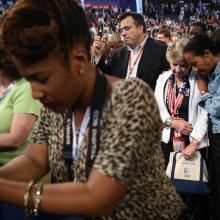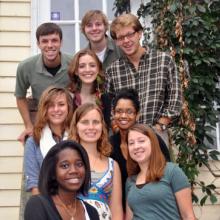Millennials
Many Christians have a confidence problem. They love Christ but are ashamed of everything associated with him. They want to be known as a Christian — just not that type of Christian. You know the type: the Westboro Baptists of the world; the scumbag televangelists on late-night cable; the fear-mongering preachers spewing apocalyptic prophecies; the proselytizers that scream at people outside of baseball stadiums; the celebrities claiming stupid things in the name of God; the “friends” who post bigoted messages on Facebook; the politicians who manipulate faith communities to serve their agendas; the anti-science, anti-environment, anti-women, anti-homosexuality, and anti-everything Christians who basically spread negativity wherever they go — the people who drag Christ’s name through the mud.
Today’s believers are hypersensitive and self-aware about the current events happening within media and culture, and in a society obsessed with consumerism, corporate loyalty, branding, product placement, and publicity, they understand that the Christian reputation is experiencing a fast decline, and they feel guilty by association.
This decline is not just happening in the “secular world,” but also within faith communities. Infighting, criticism, and self-deprecation are rampant within the American Church, and much of this is deserved, but it also reflects a corporate Christian identity that feels embarrassed and humiliated.
Making an ultimatum about church attendance to a sleep-deprived teenager may be my own version of hell on earth.
“We are leaving for church in 10 minutes,” I said, summoning my most authoritative voice before the lifeless lump under the covers.
My seven-year old Annie Sky watched the tense exchange between me and my 14-year old daughter Maya, who made periodic moans from the top bunk. With furrowed brow, my first grader sat on the couch, as if observing a tiebreaker at Wimbledon with no clear victor in sight.
For a moment, I wondered why I had drawn the line in the Sabbath sand, announcing earlier in the week that Maya would have to go to church that Sunday morning after an all-day trip to Dollywood with the middle school band. Somehow I didn’t want Dolly Parton’s amusement park to sabotage our family time in church. (The logic seemed rational at the time).
When Maya lifted the covers, I glimpsed the circles under her eyes and sunburn on her skin. But I repeated my command, with an undertone of panic, since I wasn’t sure if I could uphold the ultimatum.
When she finally got into the car, I breathed deeply and turned to our family balm, the tonic of 104.3 FM with its top 40 songs that we sing in unison. As the drama settled, I realized one reason why I made my teenager go to church: I want my daughters to know that we can recover from yelling at each other (which we had) and disagreeing. We can move on, and a quiet, sacred space is a good place to start.
While everyone was blowing up the Twittersphere decrying the injustices of the Oscars, as movies like Argo walked away with Best Picture honors, I was sitting in a Philadelphia hotel lobby trying to chew on everything I’d heard and seen at this year’s Justice Conference.
The two-day event brought together more than 5,000 people to promote dialogue around justice-related issues, like poverty and human trafficking; featured internationally acclaimed speakers such as Gary Haugen, Shane Claiborne, and Eugene Cho; and exhibited hundreds of humanitarian organizations.
While there is certainly more thinking and processing to be done, here are four things that stood out.
As President Barack Obama comes off of a substantial second victory, many pundits have pointed to the youth vote and a significant factor in his most recent success. Reports show that 60 percent of young voters cast ballots for Obama, while only 36 percent voted for Gov. Mitt Romney's more conservative policies. While many older voters believe this suggests young voters are unaware or uninterested in the nation's economic concerns, a major platform in the 2012 election, a number of polls suggest the economy is actually a top priority for most young voters. As it happens, though, young people seem to have very different ideas on how best to handle economic instability than their older counterparts.
The day after the election, Southern Baptist Seminary President Albert Mohler said, “I think this was an evangelical disaster.”
Not really. But it was a disaster for the religious right, which had again tied its faith to the partisan political agenda of the Republican Party — which did lose the election. But Nov. 6 was an even deeper disaster for the religious right’s leaders, because they will no longer be able to control or easily co-opt the meaning of the term “evangelical.”
During this election, much of the media continued to use the word as a political term — as a key constituency of the Republican conservative base. But what the media really means when they use term “evangelical” is “conservative white evangelical.” All other kinds of evangelicals are just never counted.
Just as the 2012 electoral results finally revealed the demographic transformation of America — which has been occurring for quite some time — it also dramatically demonstrated how the meaning of the word “evangelical” is being transformed.
Evangelical can no longer be accurately used to mean “white evangelical.”
It was December of 2000, but I remember the occasion as if it were yesterday.
It was a few days after Christmas during my senior year of college. I was quite nervous, and I wondered how my friends and family would react.
How would my basketball teammates respond? Would my roommates treat me differently? And of course, what about my girlfriend? She had no idea our relationship would take such a dramatic turn.
I could hide no longer. I had to be honest with who I was. And so, after a great deal of delay and long nights of nervous planning, I finally decided to share what I had been keeping secret.
Beginning with my girlfriend, then my parents, brother, sister, and eventually friends, roommates, and teammates, I shared the news: After a significant amount of prayer and discernment, I was no longer planning to attend law school following college graduation, but instead, I wanted to attend seminary in order to become an ordained Lutheran pastor.
As to be expected, I received mixed reactions.
My parents were confused and surprised, as they – like most people – had not perceived me as “religious”," especially not to the point of pursuing ordination. Nevertheless, they accepted the news with delight and affirmation.
In addition, my girlfriend (who is now my wife) was wonderfully supportive. So was my brother, sister, and closest friends.
On the other hand, some others were not sure how to react. My friends – mostly uninterested in religion – wondered about future plans. Basketball teammates were a bit uneasy. And even the campus priest and a few professors had an assortment of reactions. While a number of people were anxious and apprehensive, those within my closest circle of friends accepted the announcement with open arms.
I continue to thank God for such a wonderful web of support.
On Tuesday, the religion, policy, and politics project at Brookings and the Public Religion Research Institute (PRRI) hosted a forum to release PRRI's fourth American Values Survey (AVS), a large national, multi-issue survey on religion, values, and public policy.
We sent some of our interns to listen in on the findings. Here's what they thought about some of the issues raised by the report.
Editor's Note: Sojourners has launched this new blog series to help shed light on the nation's latest "religious" affiliation. Go HERE to read their stories. Or EMAIL US to share your own.
PBS Religion & Ethics Newsweekly has launched a new mini-series on the rise of the unaffiliated. Go HERE to read more about this week's epidsode.
Watch None of the Above: Political Implications on PBS. See more from Religion & Ethics NewsWeekly.
What culture war? At a survey release of young evangelicals and proceeding panel discussion, common ground was the pervading theme.
While panelists ranged in religious and political backgrounds — representing groups like Young Evangelicals for Climate Action, World Relief, Family Research Council, USAID, World Vision, the Manhattan Declaration, and Feed the Children — there was an overarching agreement that while young evangelicals are largely pro-life, life issues now extend to beyond the typical to things like creation care and immigration.
“There is still a lot of tension that many young people feel in trying to identify with one political party or the other,” Adam Taylor, vice president of advocacy for World Vision. “… There is a real deep commitment to a pro-life agenda, but that agenda has now expanded and includes a core and strong commitment to addressing issues of poverty.”
Except for presidential candidates and some parts of the Bible Belt, the days when church membership was necessary for social acceptance are long gone. Many Americans view religion as suspect or superfluous or both.
In fact, the latest data from the Pew Forum on Religion & Public Life say that a record-high one in five Americans -- and one in three adults under age 30 -- are religiously unaffiliated.
So why did all 1,500 seats sell out for a debate I moderated a few months ago entitled “Has Science Refuted Religion?” at the California Institute of Technology? Why should the brilliant minds of the Caltech community even care, especially since skeptics, rather than true believers, made up the majority of the audience?
As the dean of a theology school, the question is of high interest to me, and I think I know the answer.
Young millennials — age 18 to 25 — are more comfortable with an evangelical than Mormon (or atheist or Muslim) president. This, according to part two of the Millennial Values Survey put out by the Public Religion Research Institute and Georgetown University’s Berkley Center.
Nearly six in 10 of those surveyed say they would be comfortable with an evangelical Christian serving as president, while 44 percent would be comfortable with a Mormon.
The numbers line up with those supporting President Barack Obama over Gov. Mitt Romeny at 55 percent to 39 percent — a spread that has actually increased 16 points since March.
But that won’t necessarily convert into votes. Nearly two-thirds of those surveyed are registered to vote, but only half report they are absolutely certain they will cast a vote in November.
The candidates’ religion isn’t the only factor affecting young peoples’ voting patterns. Another issue is a lack of voter engagement in the political process altogether.
“Millennials have a reputation for being the ‘wired’ generation, but when it comes to government, they’re unplugged,” said Daniel Cox, PRRI research director, in the news release Friday. “Across a range of measures, younger millennials indicated that they are disillusioned with the government’s ability to respond to their needs.”
Writing for Newsweek Magazine, Joel Kotkin wonders if the Millennial generation will be remembered as the "screwed generation:"
"Today’s youth, both here and abroad, have been screwed by their parents’ fiscal profligacy and economic mismanagement. Neil Howe, a leading generational theorist, cites the “greed, shortsightedness, and blind partisanship” of the boomers, of whom he is one, for having “brought the global economy to its knees.”
How has this generation been screwed? Let’s count the ways, starting with the economy. No generation has suffered more from the Great Recession than the young. Median net worth of people under 35, according to the U.S. Census, fell 37 percent between 2005 and 2010; those over 65 took only a 13 percent hit.
The wealth gap today between younger and older Americans now stands as the widest on record. The median net worth of households headed by someone 65 or older is $170,494, 42 percent higher than in 1984, while the median net worth for younger-age households is $3,662, down 68 percent from a quarter century ago, according to an analysis by the Pew Research Center."
Read more here
Is the Mainline Liberal Church in decline? Numerically, sure. Absolutely. But what this means, I cannot say. Many have tried to make sense of it. In the wake of recent editorials, some theologians and others have offered up their thoughts. I surmised it might be helpful to collect one or two of the links here on the outside chance that you missed them.
Can Liberal Christianity Be Saved - Ross Douthat offers some sharp critiques of the tradition. Once the bastion of the Social Gospel movement, the liberal mainline is not all "social" and very little "Gospel."
"But if conservative Christianity has often been compromised, liberal Christianity has simply collapsed. Practically every denomination — Methodist, Lutheran, Presbyterian — that has tried to adapt itself to contemporary liberal values has seen an Episcopal-style plunge in church attendance. Within the Catholic Church, too, the most progressive-minded religious orders have often failed to generate the vocations necessary to sustain themselves."
There have been a couple of good direct responses to Douthat's OpEd piece.
The Atlantic provides some insights into its recent American Values Survey, conducted in conjunction with The Aspen Institute:
"Americans say they are more tolerant and open-minded than their parents. Among the issues that rate more morally acceptable today than a decade ago: homosexuality, human cloning, pre-marital sex, and having a child out of wedlock. At the same time, half believe the economic system is unfair to middle- and working-class Americans, and only 17 percent believe Wall Street executives share fundamental American values. In all, two-thirds think the country is heading in the wrong direction, 69 percent believe the country's values have deteriorated since the 1970s, and nearly half say values will further weaken over the next 10 years."
Read more and see the results charted here
Writing for The Daily Beast today, Joel Kotkin argues:
The developed world’s youth shouldn’t expect much help from an older generation that has preserved its generous arrangements at the cost of increasingly stark prospects for its own progeny. Instead the emerging generation needs to push its own new agenda for economic growth and expanded opportunity.
Read more here
The Church is not a purity cult. We try to turn our institutions into purity cultus of behavior or belief all the time. We're really good at it. We've fought wars over our theologies wrapped in nationalism. We've crusaded from west to east all in the name of the purity of the Church. "Ex filio" was a war cry a thousand years ago.
Rachel Held Evans is right. Evangelicalism may very well be losing a generation and by extension, we all are. But then some of us have been losing parts of generations for a long time. Some of the Boomers walked never to return. More of Gen X did the same. Now the enormous generation of Millennials is having its say. Many are voting with their feet. They are tired of the culture wars. They are tired of the purity fights. Many people from various generations are. They are all voting with their feet. The same thing is happening in Catholicism though some are choosing to stay. If it weren't for the influx of Catholic immigrants to the US, we'd see the same statistical free fall in Catholicism that the mainline is experiencing.
Three decades ago, the evangelical faithful was galvanized by public debates over abortion, the size of the federal government, the future of the traditional family, and religious liberty. Many responded by following divisive leaders into the culture wars with the promise that voting for "moral" leadership would end abortion, protect traditional marriage and put our country on the right track.
How did that work? Not so well, it turns out.
On Thursday, Sojourners launched its 2012 election campaign, Voting For Us, and the Public Religion Research Institute and Berkley Center released its “2012 Millennial Values Survey.” Young Christians, and particularly young evangelicals are a significant demographic to understand. They could be a large “persuadable” population in the run up to the November elections.
What do they believe? What are their priorities? How will they vote?
Young evangelicals are different from their parents and any generation that has preceded them. Their priorities are changing, their world view is shifting and their political engagement is becoming increasingly nuanced – going well beyond the narrow interests of the Religious Right that until now have been associated with evangelicalism in the United States.
As part of the rollout for "Millennial Values Survey" from Public Religion Research and the Berkley Center, I sat at Georgetown University and listened to a very long list of what pollsters think makes up college-age millennials. I’m in the right age bracket, but I couldn’t stop thinking about what a difference just a few years makes.
I’m part of the millennial generation, albeit at the high end of the spectrum. At 29, my attitudes and behaviors look completely different to those on the lower end. Part of it, of course, is phase of life. I’m a professional, married, with a few life experiences under my belt. Most of the respondents of the survey are in college or recently graduated—half live with their parents.
In discussing the survey results with a 23-year-old friend, we worked through both obvious and subtle differences. Some key characteristics of this cohort, and perhaps ways to engage them, surfaced.












